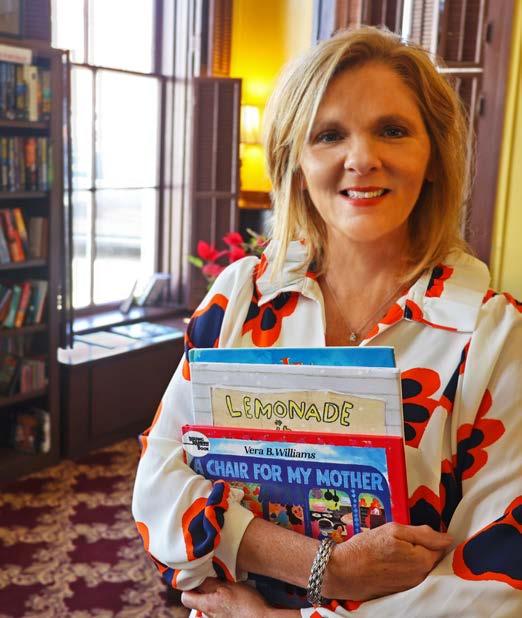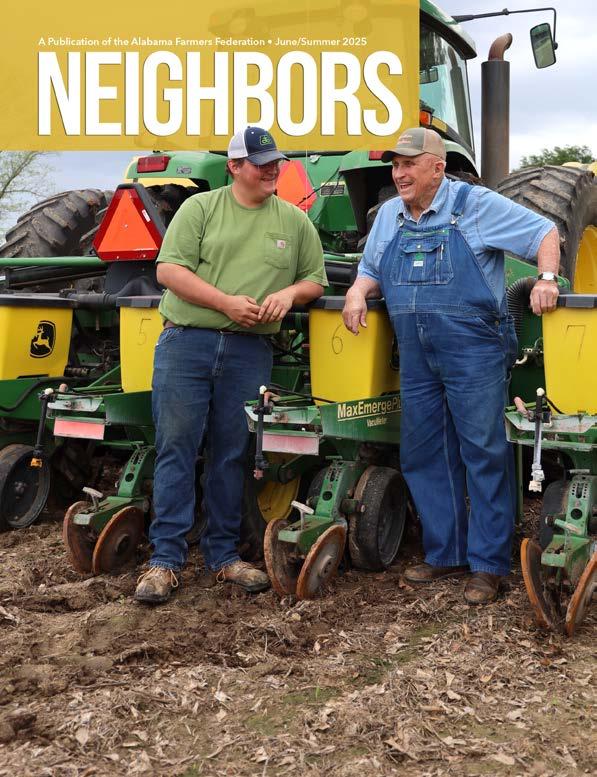
Top 10 Tips for Growing Tomatoes




Coastal Alabama
Community College has put innovative thinking and education to practice in the field helping landowners across southwest Alabama.
Invasive species management is one of four focal points for the USDA National Institute of Food and Agriculture-funded Partners for Agricultural Innovation and Sustainability (PAIS) project. The program, a collaboration between Coastal Alabama and the University of West Alabama (UWA), is in its second generation of renewal after demonstrating success in invasive species management, forest management, soil health consultation, and pollinator support across the region.
“We were inundated with hogs,” said Stan Boggs, a landowner in Gilbertown, Ala. “The interns
significantly, and the turkey population has climbed ever since
Through the PAIS program, the college has set up traps and removed over 1,179 feral swine, providing relief to landowners dealing with the destructive species.
In addition to feral swine, PAIS has tackled cogongrass. Despite its presence in over 75% of Alabama counties, PAIS has effectively removed 608 patches of cogongrass, totaling approximately 2.54 million square feet. In Alabama, where timber production generates over $16 billion annually, controlling cogongrass is crucial. The invasive plant negatively impacts forest and hunting lands and increases prescribed fire temperatures to levels that native plants cannot withstand.

they can assist agricultural sustainability.”
Through PAIS’s efforts in soil health, landowners are able to maximize production, ensuring healthier soil, crops, and farms.
“They were a tremendous help,” Boggs said. “I really appreciate it.”

Manpower is where Coastal Alabama Community College has played a key role, with student nterns in the PAIS program aining hands-on experience while addressing critical environmental challenges in southwest Alabama.
Our students receive training and xperiences outside the classroom hat enhances their academic studies,” said Schuyler Huff, Biology Instructor and PAIS faculty liaison
Recognizing its impact on conservation, the Alabama Wildlife Federation’s Board of Directors named the Partners for Agricultural Innovation and Sustainability the 2022 Land Conservationist of the Year at the Governor’s Conservation Achievement Awards.

www.alabama.edu
June/Summer 2025 | Volume 50 | Number 5
Marlee Jackson | Editor
Laura Unger | Graphic Designer
ALABAMA FARMERS FEDERATION
Paul Pinyan Executive Director
Jeff Helms | Director of Communications
FEDERATION OFFICERS
Jimmy Parnell | President, Stanton
Mark Byrd | Vice President | North, Danville
Jon Hegeman Vice President | Central, Anniston
Chris Carroll | Vice President Southeast, Ariton
Jake Harper | Vice President | Southwest, Camden
Steve Dunn Secretary-Treasurer, Evergreen
DIRECTORS
Dorman Grace | Jasper Jeff Peek | Athens
David Bailey | Dawson
Darrell Lee | Addison
Joe Anders Northport
Phillip Hunter | Birmingham
Mahlon Richburg Auburn
Tommy Martin | Moundville
Bill Cook Montgomery
Trip Horne | Louisville
Mark Kaiser | Daphne
Jerry Peak | Chancellor
Rachel Chastain | Talladega Denzil Dees | Epes
Neighbors (ISSN 0162-3974) is published monthly by the Alabama Farmers Federation, 2108 East South Boulevard, Montgomery, Alabama 36116 or (334) 288-3900. For information about Alabama Farmers Federation member benefits, visit the website www.alfafarmers.org. Periodicals postage paid at Montgomery, Alabama, and additional mailing offices. Printed in the U.S.A.
POSTMASTER
Send address changes to Neighbors P.O. Box 11000, Montgomery, Alabama 36191-0001
MEMBERSHIP AND SUBSCRIPTION CHANGES 800-392-5705, Option 4 or BWatkins@alfafarmers.org
ADVERTISING REPRESENTATIVE
Ben Shurett, (256) 997-7922 BenShurett.alfafarmers@gmail.com
DISCLAIMERS: Advertisements in Neighbors do not represent an endorsement by the magazine or Alabama Farmers Federation. Editorial information from sources outside the Alabama Farmers Federation is sometimes presented for our members. Such material may, or may not, coincide with official Alabama Farmers Federation policies. Publication of information does not imply an endorsement by the Alabama Farmers Federation.
www.AlfaFarmers.org




David
Photo By Maggie Edwards





By Maggie Edwards
Colorful flowers and cattle pastures are nestled in the hills of northeast Alabama’s McLeod Family Farm.
“It’s a peaceful feeling being here,” said Julia McLeod, who farms the Cleburne County land. “This place saved me. Agriculture has pulled me back in. I have such big dreams for the farm.”
The vision began in 2008 when she inherited and bought family land. McLeod and husband Brian went to work on the property that sat idle since last being farmed in the ‘80s.
Nine years ago, she stepped into the cut-flower industry after 18 years in real estate. Brian owns a landscape design company based in Carrollton, Georgia.
“I had always gardened with my
father, Eddie Gaines,” McLeod said. “We’re out here every day together. It’s like being on a playground with my daddy. My idea for a cut-flower farm began with a bag of zinnia seeds he purchased.”
What started small has blossomed into a beautiful, booming direct-toconsumer business.
“I’ve always had a love for flowers,” McLeod said. “When I realized I could start growing them, my passion increased. I am completely self-taught and have discovered a lot of teachers on social media and have used YouTube and textbooks. I crave hands-on learning and have enjoyed finding different areas on the farm where we can grow better quality crops.”
In the beginning, the McLeods parked a flower truck at various community events. While that’s still a customer favorite, the farm has grown production into florist markets, wholesale and Community Supported Agriculture (CSA) programs.
“The demand I am trying to meet has pushed me to expand production into high tunnels,” McLeod said. “I am
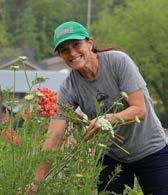
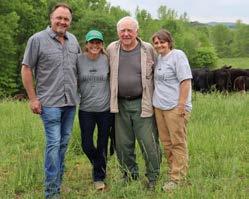
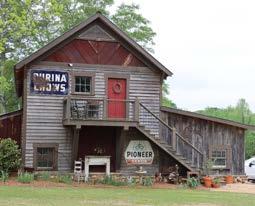

digging into growing higher-quality blooms.”
It’s an outlet to serve the community, too, she said.
“I give away so many flowers because God has been so good to me,” McLeod said. “Flowers just make people happy — and that makes me happy.”
Aside from being a talented and artistic flower grower, McLeod is an encourager to fellow farmers.
“Growing flowers pairs with fruit and vegetable production,” said McLeod, the Alabama Fruit & Vegetable Growers Association (AFVGA) secretary/treasurer. “It brings more variety, especially if you are selling your product at a market or roadside stand. Everyone loves flowers. It brings joy — much like produce.”
AFVGA Executive Director Blake Thaxton said McLeod is right.
“Flowers fit very well,” Thaxton said. “AFVGA is privileged to have flower farmers join our group. Julia and Brian get a lot of credit for that. They started coming to the AFVGA Conference and saw firsthand how flowers can fit into what fruit and vegetable farmers do. Their ability to network and create connections has been key for the association.”
The McLeods have two children, Duston Tucker, 22, and Auston, 29. The family is growing, too. Auston and wife Abbi are expecting the farm’s sixth generation.
The farm also includes Julia’s father, Eddie Gaines; her mother, Pat Bruner;
and family friend Ginger Baughn.
“We love it here,” said Eddie, a U.S. Marine Corps veteran. “It’s home. It’s where I grew up. I always told my poppa I would be back. When he died, I lost the farm. It took me 28 years to get it back. I’m proud to see Julia and Brian continuing our family heritage.”
It’s a blessing to the McLeods, too.
“My biggest joy is being a steward of the land and doing it with my family,” McLeod said. “If I can do anything, it is to leave this land a lot better than I found it.”





Farmers from across Alabama gathered at the State House on multiple occasions during the 2025 legislative session to encourage lawmakers’ support for Alfa Health Plans legislation.
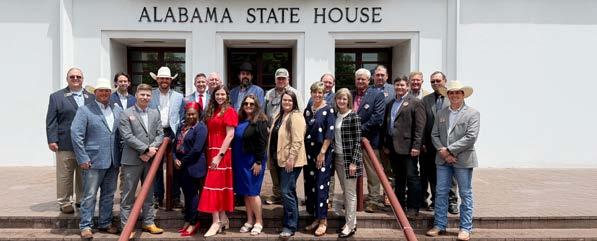
By Tanner Hood
Alabama Farmers Federation
members clad in cowboy hats, boots and well-starched jeans filled State House halls this spring to promote and defend the organization’s top legislative priority — Alfa Health Plans.
These grassroots efforts were key to successfully passing Alfa Health Plans legislation, said Federation External Affairs Department Director Brian Hardin.
“This bill is important for the survival of some family farms, and our members showed lawmakers just how important it is by being there for every public hearing, committee vote and floor vote,” Hardin said. “The continuous calls, texts and visits to legislators were essential to driving this across the finish line.”
Alfa Health Plans legislation will allow the Federation to offer affordable health coverage as a member-benefit option for those who qualify. HB 477

was carried in the House by Rep. David Faulkner, R-Mountain Brook, and in the Senate by Sen. Arthur Orr, R-Decatur.
HB 477 was signed into law May 7 by Gov. Kay Ivey. The Federation intends to implement Alfa Health Plans this year.
Federation President Jimmy Parnell expressed gratitude to the governor and legislators for their support.
“We thank Gov. Ivey for signing this important legislation into law,” Parnell said. “Farmers and other small business owners face incredible challenges when it comes to health coverage. The Federation is excited to help members address soaring health care costs by providing an option through Alfa Health Plans.”
Alabama is the 11th state to sign health plan legislation into law — thanks to member engagement, Hardin said. This included farmers from across the state who shared stories about why they need Alfa Health Plans in videos, through articles and at public hearings.

Another grassroots success included passing legislation to modify the cap on the assessment for the cotton checkoff.
Supported by the Federation’s State Cotton Committee, the Alabama Cotton Commission (ACC) requested to increase the cap from $1 to $1.30 per bale to help promote Alabamagrown products and improve markets. The legislation was sponsored by Rep. Danny Crawford, R-Athens, and Sen. Josh Carnley, R-Ino.
Madison County farmer and ACC Chairman Mike Tate said passing the legislation was vital for the checkoff to overcome inflation and increased costs’ effect on research, education and promotion. The ACC does not plan to increase the cost over $1, though Tate said the flexibility was important.
“We needed this authorization from the legislature to continue operating the cotton checkoff successfully,” Tate said. “This was very important to Alabama cotton growers, and we appreciate Sen. Carnley and Rep. Crawford for their continued support.”
The Federation also monitored a number of successful bills, including requirements for weighing log trucks and the use of portable scales, immigration enforcement and deer breeder property rights.
Other legislative milestones included passing record budgets, a reduction in the grocery sales tax from 3% to 2%, pharmacy benefit manager (PBM) reform and the RAISE Act to target areas of need for increased funding in public schools.

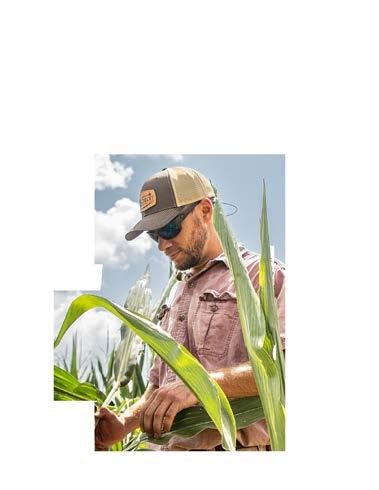
for everything from
and
to
that get the job done. Whether you’re starting or expanding your agricultural operation, we o er long-term or short-term credit options. Call us today to learn about our competitive rates and how our relationship lending can help your farm thrive.

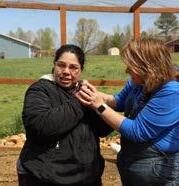

By Marlee Jackson
Simple moments yield great joy at
Next Step Farms in Madison County.
“I’m thankful I got to hold a baby chicken,” farm client Morgan said during lunch, a family affair where friends, staff and guests gather, voice something for which they’re grateful and enjoy a meal.
That morning, Morgan and fellow farm clients gathered eggs, fed livestock and helped build steps for a shed —
activities that teach important skills to adults with cognitive disabilities, said farm founder Robin Kramer.
“If our goal is to teach them to be as independent as possible in a home environment, then we need something that provides a lot of opportunities,” Kramer said. “A farm takes it back to the basics. Our society has become too instantaneous. On a farm, you can’t rush it. You’ve got to understand the process from A-Z.”

Seeds of inspiration for Next Step Farms were sown over a decade ago. As a special education teacher, Kramer incorporated farming into her middle school course of study. Chickens illustrated the life cycle, while selling eggs taught math and money management.
Years in the classroom also taught Kramer that after age 21, formal education opportunities are slim for students with an IQ below 70.
Then, in 2019, a former student’s mother called Kramer. Graduation was
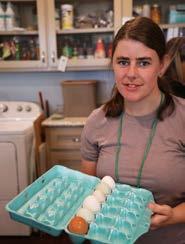


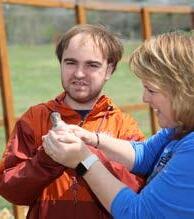
anxious to maintain structure in his days after high school.
“You said you were going to do something,” the mom reminded Kramer. “I need to know what it is. I need to know my next step.”
Inspired, Kramer responded.
“It’s Next Step Farms,” she said. Fast-forward to March 13, 2020, when COVID-19 spurred a national emergency — and Kramer realized she could retire. Business plan and license in hand, her next move was finding land in a booming urban area.
Kramer credits her Creator for crafting a scenario where Next Step
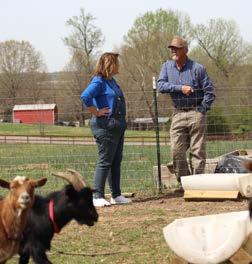
Today, 18 adult clients learn healthy habits on the Madison County homestead.
Structured days mimic that of many jobs, where workers clock in, pour coffee and chat. Then, teams start hustling.
The culinary crew prepares lunch or makes jams, pickles, salsa and more that’s sold on the farm and in markets. Business team members answer phones and clean. Others tend livestock, check fences or work on construction projects.

“I allow my clients to do everything,” Kramer said. “There’s not a mistake around here. Are plates broken and goats let out? Yes! But those are learning opportunities. You and I don’t learn when everything goes right all the time.”
The nonprofit’s helpers include paid staff and volunteers, like Kramer’s parents, Al and Sherry Visone.
“I wasn’t going to volunteer,” Al said. “I didn’t think I had anything to teach them, but they’ve taught me so much instead.”
Clients’ gentle spirits and adaptability similarly impacted volunteer-turned-employee Dwain Clardy. A retired contractor, he helped build Next Step Farms’ office and education building, which opened in 2023.
“The clients just touched my heart, the joy they have being in this place,” Clardy said.
Kramer said five clients, equipped with new skill sets, have already earned
jobs off the farm. Two more have moved onto trade school.
A special couple integral to Next Step Farms’ ministry is farmer Rex Vaughn and his late wife, Kim.
“I could not have done it without them,” Kramer said. “They both believed in what we are doing here. More than being childhood friends with Rex, they were personal friends and role models.”
Kim’s legacy lives on at Next Step Farms — albeit unusually. When Vaughn Farms donated a calf in February, Kramer upheld a farm tradition where significant gifts receive a name that shares their story.
Kimmy the Calf became a fast favorite, Kramer said, with clients and volunteers clamoring to bottle-feed the animal.
Rex said Kramer’s can-do spirit and go-with-the-flow mentality help clients feel loved, valued and capable of accomplishing any task.
It takes a weight off caretakers, too, knowing loved ones are safe, cared for and learning real-life skills.
“When Robin had this idea, I thought it was going to be a heavy lift,” said the Madison County farmer. “She would not quit. She would not be told, ‘No.’ She looks for His direction each and every day to see how she can impact people who are overlooked.”
He continued, “The magic of Next Step Farms is nothing is wrong there. It’s all a learning experience.”
Learn more at NextStepFarms.org.
Alabama farmer Monica Carroll is bringing decades of agricultural experience, plus a passion for serving people, to her new role as the state’s Farm Service Agency (FSA) executive director. Appointed by U.S. Secretary of Agriculture Brooke Rollins, Carroll began May 5.
“When we have farmers who come in and look for our programs, I can relate to them,” Carroll said. “I have lived that life, so I know how important it will be that we get programs out there to farmers as fast as possible.”

A subset of the U.S. Department of Agriculture, FSA handles critical programs related to conservation, natural disasters and risk management. Carroll said she looks forward to supporting a key facet of FSA — its staff.
“I’m excited about our employees,” she said. “They get it. We have a lot


of good employees who care about what we do. I’m excited about getting to know them and letting them know, as a farmer, how much we appreciate them and what they do for farmers.”
Carroll and her husband, Chris, have firsthand knowledge of FSA’s significance. Their 4C Land & Cattle Co. outside Ozark in Dale County includes cattle, poultry, row crops, hay and timber. Their children — daughter Brittany (Blake) Gulledge and son Blake (Savanna) Carroll — are involved on the farm, too.
As executive director, Carroll will work closely with the FSA State Committee, a panel of farmers that implements federal programs. Carroll chaired that committee during the previous Trump administration.
Her appointment comes at a critical time for Alabama agriculture. Farmers
are facing the worst economic crisis since the 1980s; a relief program passed last year is being implemented; and Congress is expected to draft a long-overdue farm bill later this year.
Alabama Farmers Federation President Jimmy Parnell said it’s critical to have a farmer at the helm of FSA during trying times.
“Monica understands Alabama agriculture,” Parnell said. “We’re excited to have a leader in place who understands the tough times our farmers are facing. We believe her leadership will have a profound impact on how this agency helps Alabama farmers and landowners improve their land, livelihood and legacy.”
Carroll, a longtime leader in the Federation, has extensive relationships with fellow producers and advocates for ag literacy through the State Women’s Leadership Committee. She and Chris were named Alabama’s Outstanding Young Farm Family in 2006. They attend Ariton Baptist Church.

By Brooke Foster
Weathering storms is par for the course in Alabama — from spring tornadoes and summer thunderstorms to fall hurricanes and winter freezes.
When those natural disasters occur, Alfa Insurance policyholders have access to adjusters known for quick, efficient assistance, said Vice President of Claims David Bailey.
“One thing our customers can count on is Alfa to show up when they need us most,” said Bailey, who
o Make a detailed list of inventory in your home, and take photos of each room. This will help when filing a claim should you lose any items in a storm.
o Have an emergency plan in place. Know where your safe place is and how your family will get there.
o Keep a first aid kit close by, along with a weather radio, helmets, flashlights, bottled water and any necessary items, such as medications.
o Bring outside items inside your home. Alternatively, secure outside furniture and other heavy items.
o Clear limbs and debris to reduce damage from storm-related winds.
o When storms near, get your family and household pets to your safe place as quickly and calmly as possible.
o Employ helmets, blankets or even mattresses for additional layers of protection.
o Do not leave your safe place until the storm has passed.
joined Alfa’s Claims Department in 2005. “Just as much as it is our responsibility to deliver on the promise, it’s also our responsibility to make sure customers know steps they can take to mitigate damage and what to do after the storm clears.”
Bailey said taking a few minutes to follow the tips below could yield significant benefits — including reduced property damage — the next time dangerous weather approaches.
“It’s our duty and privilege as an insurance company to take care of our customers,” Bailey said. “While we can’t prevent storms and other bad things that happen, you can count on us to show up when those bad things do happen and help get your life back on track.”

o Once it’s safe, assess exterior damage to your home and outbuildings. Take photos and videos.
o Make temporary repairs to holes in roofs or windows to prevent additional water damage. Save receipts from purchases used to temporarily cover damaged areas.
o Do not touch downed lines or electrical wires.
o File a claim as soon as possible.
o Be wary of companies who try to sell you on a new roof or other services post-storm. Your agent or adjuster can provide a list of reputable companies.


By Maggie Edwards
Aswarm of itty-bitty beekeepers suited up and gathered around Grantswood Community School beehives on a late April day.
Whether it’s operating the smoker, removing a frame full of honey or picking off wax, each kindergarten student has a job on harvest day. It’s how they learn best, said teacher Andrea Riley.
“They all have to be a part of it,” Riley said. “There is no point in doing ag-related science if they don’t all get to participate. You will see a bigger difference in a child’s learning when they get to do it themselves and be fully engaged.”
The Jefferson County teacher believes in hands-on learning and has a passion for incorporating agriculture into her kindergarten classroom.
“There is such a benefit in what we’re doing,” Riley said. “There are so many standards I am covering through agriculture. That’s why I strive to encourage more educators to do the same thing I do.”

Alabama Ag in the Classroom (AITC) has been a great platform and resource for Riley. She’s presented at state and national conferences and has received several grants to help build her program, too.
AITC Steering Committee Chair Kim Earwood commended Riley on her dedication to teaching students where their food comes from — and how to produce it.
“Andrea is an example of why we do what we do,” Earwood said. “Our goal is to provide resources for ag literacy. Andrea is a trailblazer when it comes to teaching children about ag. Her cheerful spirit is a bright light in the lives of so many students and adults.”
Riley grew up on a cattle farm in Pennsylvania and has included chickens and gardening in curriculum for years. In 2022, she began beekeeping. As her knowledge grew, so did her bee bounty, in part thanks to hive donations from Jefferson County Farmers Federation board member Norman McClure.
“What better way to teach the students about bees than knowing their teacher doesn’t know everything

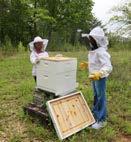
either,” Riley said. “It shows them we’re all learners and are all here to grow. I learned with them the first year. Now, I am more confident. If a 5-year-old can do it, anyone can.”
Bee lessons are covered in the classroom starting in August. In-class learning includes introduction to the bee industry, plus safety lessons. Riley’s rules are to have calm bodies and quiet mouths while actively working around bees. Once students are equipped and ready, it’s time to go outside and begin project-based learning with Riley and beekeeper volunteer Adam Crandall.
“Mrs. Riley teaches the kids about the technicality and life cycle of the bees,” said Crandall, whose children attend Grantswood. “Her approach to teaching benefited my son tremendously last year. It’s amazing how much knowledge they have when it comes to working with the bees and other animals.”
Rise and Shine Honey by Mrs. Riley’s Worker Bees is a faculty favorite, Riley said. Profits from selling the nectar help purchase feed for the class’s chickens.
Teaching students about the food system is more than a job, Riley said.
“This is my world,” she said. “It’s my calling and my mission. For us, it’s not all about how much honey we can get. The point is so the students can be immersed in their education and learn where our food comes from. There are so many kids who don’t get introduced to ag. This is their chance.”
Scan to watch on Simply Southern TV!


You have goals. With Merrill, the bull has your back.
Congratulations to THE HARTY CARPENTER GROUP for being named to the Forbes “Best-in-State Wealth Management Teams” 2025 list, published on January 9, 2025. Rankings based on data as of March 31, 2024.
THE HARTY CARPENTER GROUP
Merrill Lynch Wealth Management
601 North Section Street Fairhope, AL 36532
251.990.2361
advisor.ml.com/sites/al/fairhope-al/ thehartycarpentergroup


2025 Forbes “Best-in-State Wealth Management Teams” list. Opinions provided by SHOOK® Research, LLC and is based on in-person, virtual and telephone due-diligence meetings and a ranking algorithm that measure best practices, client retention, industry experience, credentials, compliance records, firm nominations, assets under management and Firm-generated revenue (investment performance is not a criterion because client objectives and risk tolerance vary). SHOOK’s rankings are available for client evaluation only, are not indicative of future performance and do not represent any one client’s experience and available for investor help in evaluating the right financial advisor and not an endorsement of the advisor. Compensation was not received from anyone for the rankings study. Past performance does not guarantee future results. Details available at the SHOOK Research website. SHOOK is a registered trademark of SHOOK Research, LLC.
Merrill Lynch, Pierce, Fenner & Smith Incorporated (MLPF&S) is a registered broker-dealer, registered investment adviser, and Member SIPC. MLPF&S is a wholly owned subsidiary of Bank of America Corporation. © 2025 Bank of America Corporation. All rights reserved.
MAP6679719 | AD-01-25-2396 | 472979PM-0724 | 01/2025



By Maggie Edwards
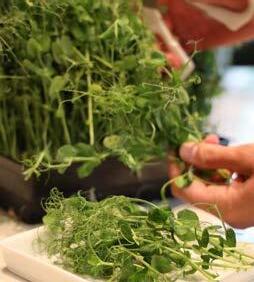
resh, local and student-grown are key ingredients to the success of Auburn University’s (AU) FoodU program.
“The idea was to create an example of a hyperlocal, sustainable food system,” said FoodU Program Coordinator Jack Maruna. “It’s opened opportunities for student-employees to get hands-on practice in the food system from seed to compost.”
The vision began in 2022 with AU’s Director of Campus Dining Glenn Loughridge and has transformed into the “Future of Food.”
The initiative encourages sustainable farming by growing produce on campus


to serve students and community members.
“I was an AU student long ago,” Loughridge said. “No one gets their freshman year back, so I wanted to find something that was special for the students. This connects different students who wouldn’t have interacted with agriculture, and it gives them a unique experience. Our goal is for them to walk out of this dining hall knowing what fresh tastes like.”
The FoodU partnership includes Campus Dining, the College of Agriculture Department of Horticulture and Ithaca Hospitality. The group effort also includes a collaboration with the College of Human Sciences, which houses the Tony and Libba Rane Culinary Science Center.
Campus Dining is integral to FoodU, said AU Department of Horticulture Associate Professor Daniel Wells.
“Glenn wants to integrate student experience to the food system,” Wells said. “We immerse students and student-employees by allowing them to grow food in different venues. This trains students in state-of-the-art growing techniques but also in problem solving.”
Aside from growing for the dining hall, FoodU contributes high-quality, fresh products to AU’s teaching restaurant, 1856. High-end chefs cherish those ingredients, Maruna said. FoodU also donates to the Auburn Campus Food Pantry.
“Our target products for campus dining are spring mix lettuce and tomatoes, where the restaurant craves unique commodities,” Maruna said. “Edible flowers and microgreens are big for culinary science. We have on-site production, which could include harvesting and consuming in the same day. The chefs are amazed at the quality

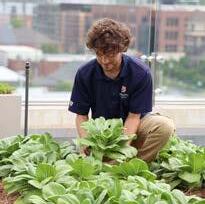

and freshness of the products.”
Diverse growing spaces like container farms, greenhouses and raised beds, plus a rooftop garden, give a consistency to the supply.
“Being up here on the rooftop allows us to see every single aspect of production,” said Max Porter, an AU senior and manager of the rooftop garden perched on the Laurel Hotel. “We care from seed to delivery and
from growing transplants to taking the product to the culinary or dining staff.”
AU student Branyon Clarke agreed.
“The hands-on involvement is cool because we work for horticulture, but we aren’t actually ag majors,” said Clarke, a biosystems engineering and environmental sciences major who helps manage the rooftop garden and raised beds. “Being from different backgrounds allowed us to learn — and
now teach others — how to grow fruits and vegetables.”
The value extends beyond the Loveliest Village, Maruna said.
“Our goal isn’t to get people to change,” he added. “We want them to get real-world practice and a better understanding of the U.S. food system. That prepares them for a life outside of college. In our world, we want Auburn to be known for food.”
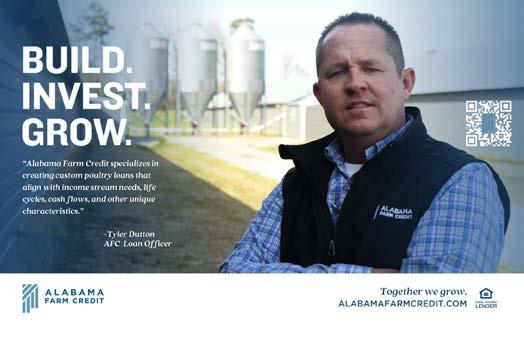
By Maggie Edwards
David Sims’ decision to help his granddaddy farm while taking online classes during the COVID-19 pandemic led to a future in farming full time — and the preservation of more than a century of Weatherly Farms.
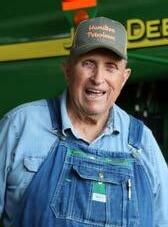
“I didn’t plan on making a career out of this, but now I don’t want to do anything else,” said Sims, the Marion County Young Farmers chairman. “It’s the only job I’ve ever had, and it’s the only one I ever want.”
The 22-year-old farmer is responsible for continuing maternal grandfather Gary Weatherly’s legacy and the 600-acre Marion County row crop operation.
“Granddaddy was getting ready to hang it up and stop farming when I was weighing my options for college,” Sims said. “That’s when I felt called to the farm. I get asked why every day. If I hadn’t, the farm was going to die, and all this was going to go to waste. It was too good for that.”
Weatherly said he hesitated to encourage his grandson because he knows the challenges that come with row crop farming.
“It hasn’t always been roses,” said Weatherly, 87. “It’s hard when you work and still don’t have anything left at the end of the year and wonder if you can pay off in the fall. We’ve been fortunate in the last few years, though.”
Tough times didn’t scare Sims away. It motivated him to work hard and make his granddaddy proud.
“You’ve got to want it,” Sims said. “If it was easy, everyone would do it.”


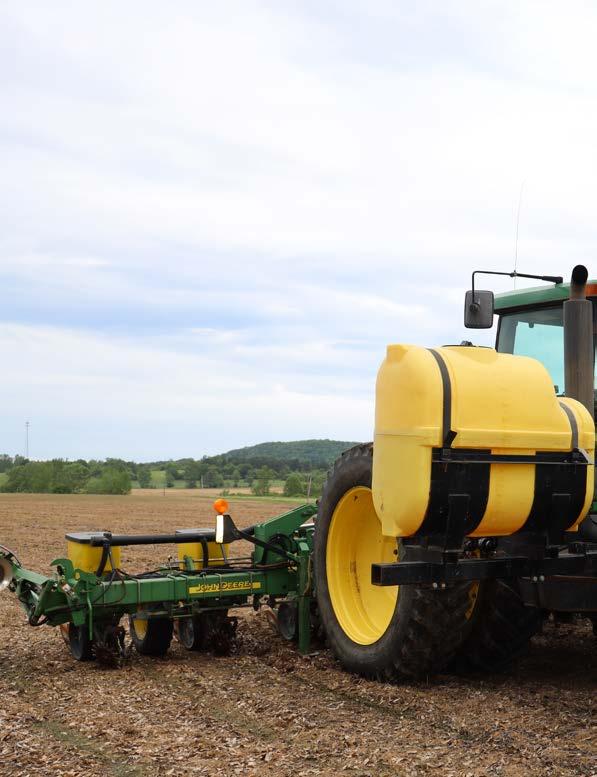
As Sims begins to write his story growing corn and soybeans, Weatherly reflects on the history of Weatherly Farms, founded in 1898.
“This farm has seen cattle, hogs, row crops and the lumber industry,” Weatherly said. “It’s gone from mules and horses to tractors driving themselves.”
Farming wasn’t always the plan for Weatherly, either. He graduated with a degree in agricultural science in the first class of Auburn University, formerly Alabama Polytechnic Institute.
He enlisted in the U.S. Air Force in 1960, hoping to make a career in the military. Weatherly returned home five years later to care for the farm and his mother after his father passed away in a farm accident.
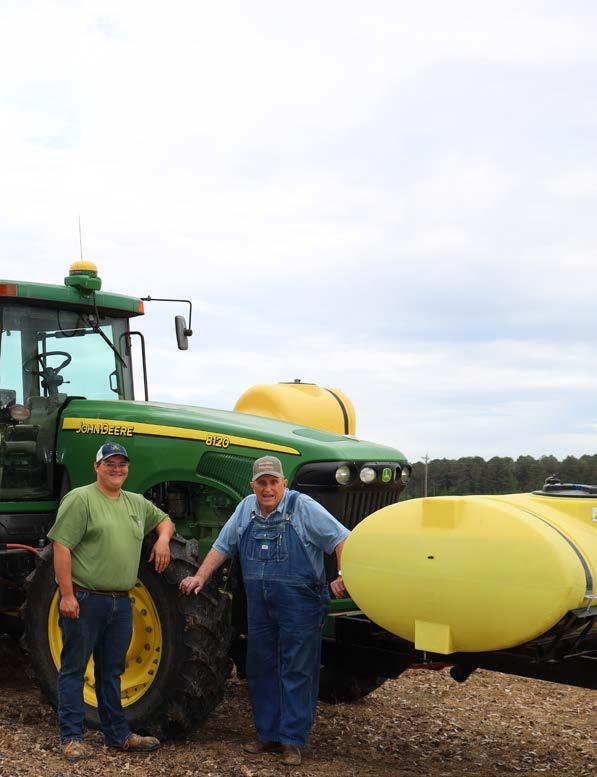
That’s when Weatherly got his start in the Marion County Farmers Federation (MCFF).
“My dad was a MCFF board member before he passed,” Weatherly said. “When I came to take over the farm, the board elected me to fill his position. I’ve been there ever since.”
Weatherly and his wife married in 1958 and later had three daughters — one being Sims’ mother, Susie, who now handles the farm’s books. Sims’ father, John, is a feed salesman at the local Farmers Cooperative.
“This is my dream now,” Sims said. “I have had the thoughts my whole life. I wouldn’t have wanted to grow up anywhere else but here. It’s special working alongside my granddaddy every day and being the reason his family heritage lives on. Not everyone gets to have that.”
That’s something to be proud of, Weatherly said.
“I love what I do,” Weatherly said. “When I passed the 86-year-old mark, I decided I couldn’t do as much as I used to could, but David gets it.”
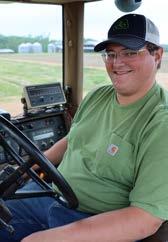
David Sims learned the ropes of farming from his grandfather. At just 22, Sims is an integral part of the operation. He leads the planting process and has begun taking on more management roles.
The row-cropping, grandfathergrandson duo has become inseparable; in addition to farm work, they eat dinner together each day. They’re two peas in a pod, Weatherly said.
“Farming is in our blood,” Weatherly said. “My family would be proud.”



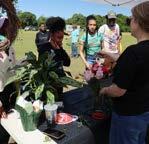

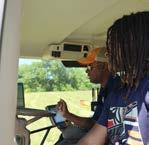
By Marlee Jackson
With nearly 70 stations that spanned from precision agriculture and paper manufacturing to forestry and floral design, the Southeast Alabama Agriculture Career Expo had something for everyone.
That’s no small feat for a sprawling spring event which served over 600 students, said Ronnie Davis.
“When you say ‘farming,’ farming extends a long way out,” said Davis, the Wiregrass RC&D (Resource Conservation & Development) Council executive director. “It’s not just John Doe and his tractor and his cows. It’s the whole community. The career opportunities in agriculture are as good as they’ve ever been.”
Wiregrass RC&D and a slate of partners like Alabama Extension shared that message during the second annual expo April 16 in Dothan.
Students from every high school in Wiregrass RC&D’s 10-county district attended — at no cost to the schools, Davis said. Those counties included Barbour, Coffee, Covington, Crenshaw, Dale, Geneva, Henry, Houston, Pike and Russell.

Justice Bull attends Wicksburg High School in Dale County. Bull said the career expo helped him think outside the box about careers in agriculture.
“I like the drone technology they were teaching — with infrared, seeing what plants are healthy and which aren’t, all from a camera on a drone,” he said. “We thought that was cool.”
Inside a barn at Landmark Park (Alabama’s official museum of agriculture), students networked with leaders from dozens of local, state and national businesses, associations and colleges. Those recruiters represented land-grant institutions, the Alabama Community College System, commodity organizations, the U.S. Department of Agriculture and other groups.
Young Farmers of Alabama members were on site, too, visiting with students, manning industry booths and helping pack lunches.
Groups also explored career options through outdoor stations. Career pathways covered veterinary medicine; urban agriculture; Alabama Forestry Commission opportunities; and technical trades, like being a power lineman, operating heavy machinery or driving 18-wheelers.

Several areas touted technology’s role in agriculture. Students rode in a tractor outfitted with autosteer and realized the importance of genetically modified crops.
Life lessons were hammered home, too.
Students who huddled around the InformedAg station heard from company founder Rees Bridges. While Bridges dove into InformedAg’s role as an ag technology consulting group, he also broadcast general advice.
“Being coachable means you take feedback if you mess up,” he said. “I promise you, you will be successful in life if you are coachable…and show up.”
Davis said sharing abundant opportunities in agriculture is more important than ever because of labor shortages and an aging workforce. Agriculture remains vital to Alabama, contributing $77.3 billion — and 273,271 jobs — to the economy every year, according to the recent Grow Alabama study.
“Everybody keeps referring to ‘the next generation,’” Davis said. “That next generation is coming along to take our place. We have got to have farmers, and we have got to have people to support farmers.”
The next generation could include students like Mariah Marshall. A sophomore at Headland High School, Marshall said she was intrigued by technology in agriculture, including genetic modification of crops.
“I was excited because this offers you a lot of job experiences,” Marshall said. “My family for generations has farmed, so I knew some of the stuff they were talking about, but it’s so cool to learn more new things you can do in agriculture.”
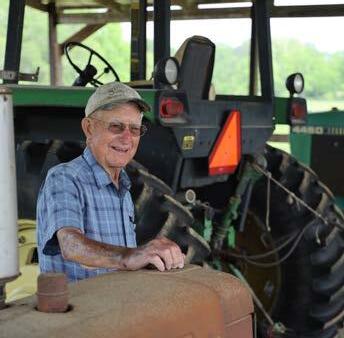

Russell Hendrix has served as Washington County Farmers Federation president on-and-off since 1965. Hendrix still offers top-notch leadership and wisdom as the state’s oldest county president. Third from left, he’s pictured with fellow board members, plus Alabama Farmers Federation President Jimmy Parnell, right.
By Tanner Hood
Russell Hendrix laces up his boots and tugs on a dusty hat as he steps outside of his Fruitdale home and heads toward the barn.
Most farmers start their day similarly. At 91 years young, Hendrix’s day veers from there.
As Washington County Farmers Federation (WCFF) president and the oldest county president in Alabama, Hendrix will field calls from farmers, politicians and general inquirers asking about the state of agriculture.
“I started with Alabama Farm Bureau (now Alabama Farmers Federation) in 1965,” Hendrix said. “I was young, and I took a trip to the Midwest when J.D. Hays was the state president. I got back, and they voted me county president.”
It’s a position he has held on-and-off since then. It’s also a role he cherishes.
“It’s just a blessing — that’s about all I can say,” Hendrix said. “Watching the political involvement grow has been a highlight, and without Alfa, we probably wouldn’t have insurance out here. I would tell someone wanting to get involved with the Federation there’s
nothing better. It was important to me and my family because it is a Christian organization and for what it has to offer its members.”
While Hendrix said the Federation’s role in politics and the business of Alfa Insurance is vital, he also believes the most important goal is helping the next generation.
“I just enjoyed farming,” Hendrix said. “Whenever you put something in the ground and it comes up, you’ve got growth; you’ve got good seed. That good seed can be a human being. You want to see it grow and make it better. We’ve got great leadership programs and activities like Farm-City that are about making it better for the future.”
Hendrix said he understands the difficulty farmers face today, having encountered similar situations since putting his first crop in the ground in 1958.
“I started with 200 acres of farm land, and back then, that was a lot,” Hendrix said. “But today, if you don’t get bigger every year, you’re backing up. Equipment goes up; inputs go up; and if you don’t grow, you back up.”
Even though he’s scaled back his
operation, Hendrix works closely with WCFF Vice President Mark Platt, who farms some of his acreage. Hendrix said two troubling years stand out for being the worst out of 67 crops. One was 1974 when corn blight affected harvests. The other was last year.
Federation Area 9 Organization Director Cameron Smith said Hendrix sets the standard for persevering when the going gets tough.
“Russell amazes me every time I’m with him because of his grit and determination to work hard,” Smith said. “He always gets back up after getting knocked down and stays sharp as a tack to provide top-notch leadership for Washington County.”
As Hendrix tinkers around his shop, he reflects on the obstacles and opportunities he’s faced over 91 years. He raised breeder flocks until Hurricane Frederic destroyed his chicken houses. He’s served on the Washington County Soil and Water Conservation Committee for 45 years and helped in numerous other initiatives. Most importantly, he raised a family alongside his late wife, Anne.
Appreciation for his bountiful blessings will fuel Hendrix again tomorrow. As the sun rises, he’ll slip on his boots, pull down the time-worn cap and go to work because “the good Lord has been looking out for me.”
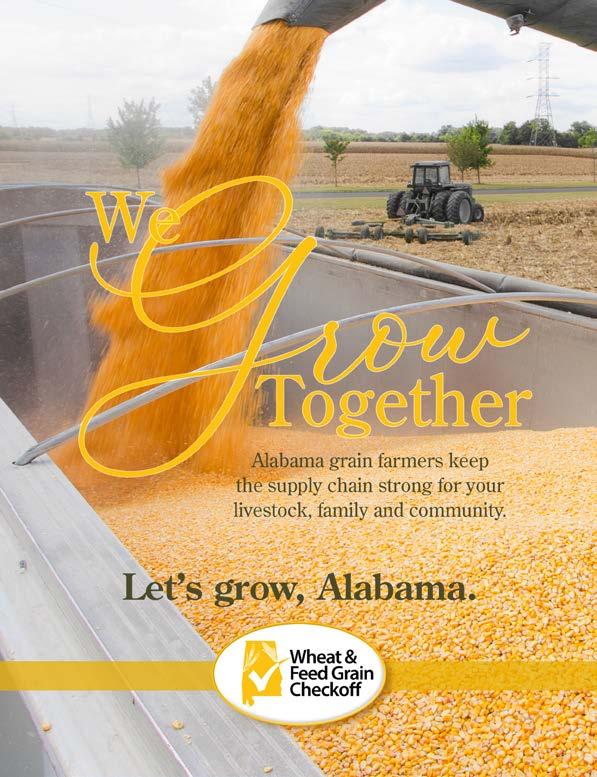


By Brian Brown
Tomatoes are among the most popular garden vegetables, but their susceptibility to various insects and diseases can make them tough to grow. Gardeners who follow these 10 steps may be more successful at keeping their tomatoes free from insects and diseases.
CLEAN UP | It’s good practice at the end of the season to remove any plant debris where insects and diseases may have overwintered.
PICK RESISTANT VARIETIES | When buying tomato seeds or seedlings from a local garden center, select a diseaseresistant variety. This will be indicated by an abbreviation on the package or label, such as TSWV (tomato spotted wilt virus).
CROP ROTATION | Avoid planting tomatoes in the same area of the garden as the previous year. Also, don’t put them where other nightshade plants, such as peppers or eggplants, grew the previous season. Maintain good garden notes every year, including maps.
SPACE APPROPRIATELY | Tomatoes should be planted 18 to 24 inches apart to help prevent disease and allow more airflow.
MULCH | Adding mulch around tomato plants prevents soilborne fungi from splashing onto the leaves when watered. Additional benefits include regulated soil temperatures and increased soil moisture retention during hot summer days.
GROUND-LEVEL WATERING | Always water into the soil and not from above. This helps prevent the spread of foliar diseases.
CONSISTENCY | Don’t let tomato plants dry out between waterings. Blossom-end rot is a physiological condition common in tomatoes caused by a lack of calcium in the fruit. Since calcium moves into the plant with water, the tomato needs a constant supply while the fruit forms.
PRUNING | Remove suckers (see photo), leaving the first sucker below the first flower cluster on indeterminate varieties to increase fruit size with earlier maturity. This will increase air flow, which helps prevent diseases and insects from proliferating.
SCOUTING AND TREATING | Check plants regularly for diseases and insects. When a problem is discovered, quickly
treat tomatoes with the necessary crop protection to avoid additional issues or fruit loss. Especially during summer, keep an eye out for fungal diseases caused by humidity, and be prepared to apply fungicide to prevent outbreaks.
REMOVE WEEDS | Pull weeds around tomato plants. Weeds can harbor insects, and they compete with tomatoes for water and nutrients.
It may not be easy, but the work required provides its own reward in a healthy, heaping harvest of juicy, flavorful tomatoes. For additional tips on growing tomatoes, visit aces.edu.


Walk into the program’s facility one morning and it’s common to see students getting their hands dirty with plants, preparing vegetation for placement in the multiple greenhouses on campus, or working outside with landscape projects.
“We’re one of the most hands-on agricultural programs you’ll find, and I believe that’s one thing that sets us apart. Our entire campus is a lab for our landscaping efforts, and that’s very beneficial,” said Wallace State Agribusiness program chair Jason Bynum, who has been employed at the college since 2001.
Wallace State’s Agribusiness program attracts individuals from all walks of life and ages. Most students seek an associate degree or certificate in the program or to transfer to a four-year university or college, while others, for example, make the drive to Hanceville to specifically learn how to improve their farming or gardening skills.
“We draw interest from all over the state. It’s common to have people drive more than hour, or even more, every day to take courses here,” said Bynum, who has been program chair since 2021. “After the COVID-19 pandemic, we’ve
had a higher volume of people interested on how to do a better job of growing their own food or how to manage greenhouses more effectively.”
Wallace State’s Agribusiness program offers an associate in applied science degree and certificate and short-term certificates in the following concentrations: nursery technician, greenhouse technician, turf technician and landscape technician.
Along the way, students dabble into hydroponics, which is growing plants in water instead of soil; aquaponics, which is a sustainable agriculture farming strategy; and much more.
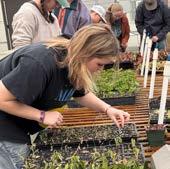
Wallace State Agribusiness graduates are spread throughout the state. Blackjack Horticulture in Birmingham has become a popular destination for recent program completers, in addition to some students working for Stonehedge Horticultural Alliance in the Decatur-Priceville area.
Community outreach is a priority for Wallace State Agribusiness. One of the newer outreaches includes participating each year in the National Collegiate Landscape Competition, hosted by the National Association of Landscape Professionals. This year’s event is at Colorado State University in Fort Collins, Colo.

Partnerships with four-year colleges or universities are important for Alabama’s community colleges, and Wallace State’s Agribusiness has a longstanding agreement with Auburn University. Poultry science majors can enroll in the “2+2” program, taking specific core classes at Wallace State before transferring to Auburn. Partnerships also exist in the agriscience and horticulture pathways. Auburn and Mississippi State are the most common transfer destinations for the program’s students, according to Bynum.
“The landscape competition is one of the best things this program has ever done. Our students love it. We’ve had success in the competitions, and it’s a great networking opportunity. People get to learn more about Wallace State on a national level. We had a student last year who had two job interviews while we were at the competition. It’s a great event,” Bynum said.


Several years ago, I went to a friend’s wedding. I arrived at the chapel early. I sat in the front pew while the piano played. It was the best seat in the house. I wanted to see my buddy’s expression when he stumbled over the words “I do.”
The chapel was adorned with white flowers and greenery. The woman beside me was the bride's elderly aunt.
“My name’s Irma,” she said, presenting her white-gloved hand. “How do you know the groom?”
“We grew up fishing together."
She looked at me like I had cockroaches crawling out of my eye sockets. “I thought he hated fishing.”
That’s when I had a feeling something was very wrong.
When the groom took the altar, I realized I’d never seen him in my life. I started having chest pains. I was at the right church on the wrong weekend.
Soon, the pianist played the familiar chords of matrimony, and the congregation stood. I was going to sneak out the back, but I was too late.
The rear doors swung open. The bride walked the aisle, wearing a gown elegant enough to break your heart.
Aunt Irma was emotional. “Have you ever seen her look so radiant?”
“Hardly even recognized her,” I said. It was a beautiful ceremony. The bride and groom recited vows they’d written themselves. Aunt Irma was sniffing so hard I handed her a Kleenex. She hooked her arm on mine. I was looking toward the fire exits.
When the preacher announced the couple, the congregation applauded. The newlyweds left accompanied by the song, “Lean on Me.” I’ve never heard this song at a wedding before or since, but it works. It works pretty well, too.

I was about to make my clean getaway when Irma grabbed my arm.
“Walk me to the reception. I’m hungry, and I have a bad hip.”
“I really need to go.”
“You can’t leave. It’s rude. Besides, I need help walking. And we need to hurry. If I don’t eat something fast I’m gonna have, whaddyacallit, seizures.”
Help.
The reception was in the fellowship hall. We ate meatballs and sipped on tea sweet enough to take the paint off most municipal fire hydrants.
When the dance floor opened, Aunt Irma asked if I wanted to cut a rug. I declined and reminded her of the titanium hip she was still paying on.
She said, “Well, I don’t mean crazy dancing.”
“I really don’t think it’s a good idea.”
“Well, then it’s a good thing I didn’t ask your opinion, isn’t it?”
Before I left the reception, I clipped a $20 bill to the money tree beside the bridal cake. I was almost to the door when I was cut off by the couple.
“You look familiar,” the bride said. “Who’d you come with?”
I choked.
“He’s an old friend,” said Aunt Irma, grabbing my arm. “He came with me.”
Before the couple could say anything else, I awkwardly shook the bride’s hand, then pumped the groom’s hand.
And in the young man’s eyes, I saw the same boyish face I used to see in the mirror. He looked like I did on the day of my wedding. The ignorance of a young man who has no idea how magnificent his own life can turn out with the right person.
I released his grip.
“If you ever wanna go fishing,” I said, “call me.” ■





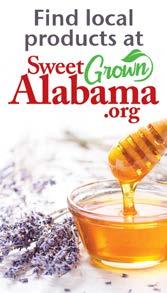
Following a national search, Alfa Endowed Eminent Scholar Mykel Taylor has been named head of Auburn University’s Department of Agricultural Economics and Rural Sociology. Taylor assumed the role April 15 after serving as interim head since fall 2024.
“I’m excited for the opportunity to serve Auburn University’s students, faculty and staff, as well as the state’s stakeholders,” Taylor said. “I look forward to assisting the Department of Agricultural Economics and Rural Sociology in upholding the land-grant mission of teaching, research and extension for the benefit of the agricultural industry and communities across Alabama.”

year. An expert in land ownership and management, Taylor has earned the trust of Alabama farmers since moving to the state, said Alabama Farmers Federation President Jimmy Parnell. Her work as the Alfa Endowed Eminent Scholar is funded through a decades-strong partnership among the Federation, AU and the Alabama Cooperative Extension System.
Taylor is a familiar face at Federation meetings, where she frequently speaks on topics such as foreign ownership of ag land. Taylor played a crucial role in compiling and analyzing agricultural data that influenced Catalyst, Gov. Kay Ivey’s recent economic strategic plan.
graduate whose family is in the timber and cattle businesses in Chilton County. “We are pleased to see her step into a new position where she will greatly impact agriculture, rural Alabama and the state’s young people.”
AU College of Agriculture Interim Dean Arthur Appel congratulated Taylor on her promotion.
“Dr. Taylor’s effective leadership, along with her vision for the department and impressive academic and research record, position her well for great success,” Appel said.
Before her move to Auburn, Taylor was a faculty member at Kansas State University from 2011 to 2020 and at Washington State University from 2008 to 2011. She earned bachelor’s and master’s degrees from Montana State University and a Ph.D. in economics from North Carolina State University.
Taylor joined AU’s faculty in 2021 and was promoted to full professor last
“In just a short time, Dr. Taylor has proven to be a valuable resource for Alabama farmers,” said Parnell, an AU
She and her husband, Justin, have three children — Camille, Marlee and Tim. They reside in Auburn.
Escambia
Pickens
Sumter
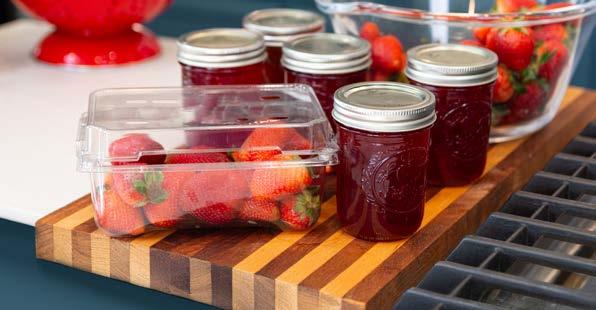
By Katie Nichols
Ever find yourself with a garden that’s bursting at the seams but not enough time to keep up with it all?
The Alabama Cooperative Extension System’s food safety and quality team has you covered with its new Pick, Pack & Preserve video series.
Whether you’re a green-thumbed guru or just starting out, this series will help turn your garden’s bounty into delicious, canned goodness at your own pace. Through videos featuring Extension agents, individuals learn everything they need to know to pick, pack and preserve produce in their home and at their convenience.
their own pace and in their own space,” Reams said. “This means you can start canning whenever it suits you, making it perfect for busy individuals or those with unpredictable schedules.”
Bridgette Brannon, also a food safety and quality agent, said a recent needs assessment told the team that individuals typically receive instruction about canning from friends, family and the internet.

“We realized that people who were learning to can at home were getting information that was either outdated or factually incorrect,” Brannon said. “There is new information that makes canning easier and safer. We share that with viewers in our series.”
Dani Reams, an Alabama Extension food safety and quality agent, said in addition to flexibility, the online video series offers the same information attendees would learn at an in-person event.
“We will still be offering traditional in-person canning classes, but Pick, Pack & Preserve allows viewers to learn at
The advice and demonstrations will help viewers gain confidence in their canning skills, she said.
Pick, Pack & Preserve was developed with the food safety and quality team’s audience in mind.
“We are here for seasoned canners, as well as those who are trying it out for the first time,” said
Rebecca Catalena, another food safety and quality agent. “Jams and jellies are popular, so we wanted to make sure our first set of videos focused on those. Our hope is this video series provides the very best and most up-to-date information to gardeners and canners in kitchens across Alabama.”
As the summer produce season approaches, the team is working on additional topics to share. Whether you’re looking to preserve the bounty of your garden or simply want to try your hand at canning, Pick, Pack & Preserve is the perfect starting point.
Visit the Alabama Extension YouTube page to watch the videos and aces.edu to learn more.

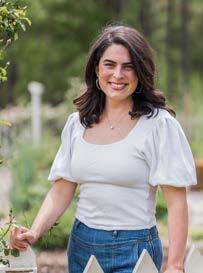
Tell us about your family.
My husband, Dylan, and I live in Woodstock and have been happily married nearly 12 years. We’re proud parents to twin girls, Janie and Ellye, who are the absolute light of our lives. When Dylan’s not working at our family owned sawmill, KyKenKee, we spend time together on the farm — caring for our registered Black Angus herd, working in the garden or tending to our orchard. I grew up just across the pasture from where we live now, and I’m so grateful to have my parents and many of our family members here on the same land where we were raised.
What does your involvement in agriculture look like?
I think I’ve always been an old soul. Even back in high school, I had a little raised garden at my parents’ house, and they never quite knew when I’d sneak another animal into my room or show up with a farm animal that needed bottle-feeding.
That love for animals and the rhythms of farm life hasn’t faded. These days, I still get the most joy out of the simple routines of our day — especially when it comes to our sweet Jersey cow, Anna. Every morning, the twins and I wake up early to milk Anna with my dad. It’s honestly the best part of our day.
Afterward, we take care of our meat
chickens and egg layers before heading out to my garden in the backyard. It’s something that’s always felt like second nature. Agriculture isn’t just what we do; it’s who we are, and it’s woven into the fabric of our everyday life.
When did you get involved in the Alabama Farmers Federation?
I was honored to join the Bibb County Farmers Federation board in 2019 and serve as secretary. I believe it’s so important for rural farming communities to have strong voices — people willing to step up, advocate and support the families who work the land.
I’m grateful to Alfa and the Farmers Federation for providing a platform that empowers us to do that.
Who taught you to cook?
Growing up with three older brothers who could eat us out of house and home, I watched my mom make hearty, home-cooked meals every day to feed what felt like an army. Being in the kitchen has just always been a part of my life. And let’s be honest — I really just love to eat!
What role does food play in your life or for your farm?
Food is at the heart of so much of what we do, whether it’s caring for our meat chickens, raising premium beef for our families, canning the bounty from our summer garden or using Anna’s delicious milk to make homemade dairy products. For us, it all comes down to one simple goal: Providing nourishing, healthy food for our family.
Do you have any signature recipes?
While most of our day-to-day meals are made from scratch with wholesome ingredients, it’s often the slightly less health-conscious treats that get everyone the most excited. At just about every family or friend gathering, I’m asked to bring my chocolate chip cookies — affectionately known as “Koli Cookies”— or my pound cake. I love cooking for a crowd; it’s the only way I know how to cook! I’ve included a few of my favorite go-to recipes for feeding a group — ones that never fail to bring people together around the table.
What have we not asked?
I love weaving the entire process of cooking into our homeschool days — from planting and growing our food to preserving it, preparing meals and, the best part, enjoying it together. I believe it’s so important to understand where our food comes from and to develop a deep appreciation for the blessings God provides. That’s something I’m passionate about instilling in my girls — a love for the land, gratitude for our food and joy in the simple act of gathering around the table.
Melt-in-your-mouth goodness with a soft, tender crumb. Delicious on its own — or topped with your favorite glaze or seasonal fruit!
Ingredients
3 sticks (1 1/2 cups) unsalted butter, softened
8 ounces cream cheese, softened
3 cups granulated sugar
6 large eggs
3 cups Swans Down cake flour
A splash (or two!) of vanilla extract
Directions
Heat oven to 325 F. In a stand mixer, cream together butter, cream cheese and sugar on medium speed for 5 to 10 minutes, until light and fluffy. Add eggs and flour in three additions. (Mix in two eggs and 1 cup of flour at a time, beating for about 1 minute between each addition.) Stir in vanilla. Generously grease a Bundt pan and spoon the batter evenly into the pan.
Bake 45 minutes, then loosely cover the top with foil to prevent over-browning. Continue baking until the cake is set and no longer jiggles (about 1 hour to 1 hour 10 minutes total). Let cake rest in the pan for 5 minutes before inverting onto a cake plate. Once cooled, top with your favorite glaze, fresh berries, whipped cream or a dusting of powdered sugar — whatever makes it feel just right for the occasion.
A bold, flavorful twist on a classic Southern favorite — with a little heat and a touch of fancy!
Ingredients
12 boiled eggs (I boil a few extras since I like to slightly overstuff the filling)
1/3 cup mayonnaise
1 tablespoon yellow mustard
1/2 cup dill relish
1 tablespoon sriracha
Sriracha mustard caviar
Directions
Boil the eggs.
Slightly crack the large end of each egg before gently placing into boiling water with a spoon.
Boil for 13 minutes, then immediately transfer to a bowl of ice water to cool.
Once cooled, peel and slice in half lengthwise.
Make the filling.
Carefully remove yolks and place them in a bowl.
Mash yolks and mix in mayonnaise, mustard, dill relish and sriracha until smooth and creamy.
Assemble.
Spoon (or pipe) the yolk mixture back into the egg whites.
Top each egg with a small spoonful of sriracha mustard caviar for a bold pop of flavor and texture.
These are my signature chocolate chip cookies — rich, soft and always in high demand at any gathering!
Ingredients
4 1/2 cups all-purpose flour
2 teaspoons baking soda
2 cups butter, softened
1 1/2 cups packed brown sugar
1/2 cup granulated sugar
2 (3.4-ounce) packages instant vanilla pudding mix
4 large eggs
2 teaspoons vanilla extract
4 cups semisweet chocolate chips
2 cups chopped walnuts (optional)
Directions
Heat oven to 350 F. In a medium bowl, sift together flour and baking soda; set aside. In a large mixing bowl, cream butter, brown sugar and granulated sugar until light and fluffy. Beat in the pudding mix until well combined, then add eggs one at a time, followed by vanilla extract. Gradually mix in the flour mixture until fully incorporated. Fold in chocolate chips and, if using, chopped walnuts. Drop dough by rounded spoonfuls onto ungreased cookie sheets.
Bake 10 to 12 minutes, or until the edges are golden brown. For even baking, rotate the cookie sheets halfway through. Let cool on the baking sheet for a few minutes before transferring to a wire rack to cool completely.
Adds a beautiful, tangy finish to deviled eggs.
Ingredients
6 tablespoons sriracha (or a sauce/juice of your choice)
2 tablespoons dry mustard seeds
Directions
Combine sauce and mustard seeds in a sealable jar. Refrigerate at least 5 days, allowing the seeds to absorb the liquid and soften. Spoon over deviled eggs just before serving.
A bold, creamy twist on traditional lasagna, packed with Tex-Mex flavors and cheesy goodness.
Ingredients
2 cups cooked chicken, chopped
1 cup red bell pepper, chopped
1/4 cup fresh cilantro, chopped
Garlic cloves, minced (to taste)
Jalapeño, chopped and seeded (to taste)
1 (15.25-ounce) can corn, drained
1 (15-ounce) can black beans, drained
1 (15-ounce) can tomato sauce
1 (8-ounce) can tomato sauce
1 (10-ounce) can Rotel
1 teaspoon ground cumin
1 teaspoon chili powder
1 teaspoon salt
16 ounces sour cream
8 ounces cream cheese, softened
Oven-ready lasagna noodles
8 ounces Monterey Jack cheese with peppers, shredded
8 ounces sharp cheddar cheese, shredded
Directions
Make the sauce.
In a large Dutch oven, combine the chicken, bell pepper, cilantro, garlic, jalapeño, corn, black beans, both tomato sauces, Rotel, cumin, chili powder and salt. Bring to a boil over medium-high, then reduce heat and simmer 15 minutes.
Mix the creamy layer.
In a separate bowl, stir together the sour cream and cream cheese until smooth and well blended.
Assemble.
Heat oven to 350 F. Grease a 9-inch-by-13-inch baking dish. Spread a third of the sauce in the bottom of the dish. Add a layer of oven-ready lasagna noodles. Spread a third of the sour cream mixture on top. Sprinkle with a third of the shredded cheese.
Repeat all layers two more times.
Bake.
Cover loosely with foil and bake for 35 to 45 minutes, until hot and bubbly. Let stand 10 minutes before slicing and serving.

The beans in your Alabama fields today are destined to see the world. Last year, we exported $83.8 million worth of soybeans. That’s a lot of overseas opportunity for one year. And we’re always growing new markets abroad to help keep this demand going strong. And if you’re wondering how far your soybeans can go, we’re charting more ways to keep your ship coming in. Learn more about the story of soy at unitedsoybean.org/hopper.


• Using children’s books for fun learning
• Exploring key money concepts: spending, saving, sharing, earning, setting goals
• Reading, playing, enjoying quiet one-on-one talks
• Strengthening family money conversations
• Developing a strong financial foundation
• Connecting libraries and experts
• Building lifelong financial independence

Sponsored by RC&D Tombigbee Council For more information, visit aces.edu/go/EarnietheEagle.

EARNIE THE EAGLE MONEY AS YOU GROW BOOK CLUB LAUNCHED THIS SPRING AT THE HALE COUNTY LIBRARY IN GREENSBORO.
